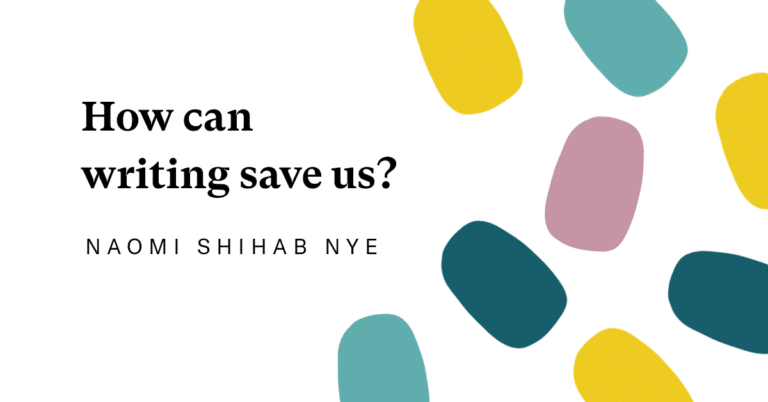Living the Questions
How can we embrace vulnerability in ourselves and in our culture?
“The incredible ripple effect of being at peace with our vulnerability in any situation is that it means that you have to develop compassion for yourself.”
On how vulnerability can bring us closer to ourselves and each other.
Living the Questions is an occasional On Being segment where Krista muses on questions from our listening community.
Guest

Krista Tippett created and leads The On Being Project and hosts the On Being radio show and podcast. She’s a National Humanities Medalist, and The New York Times bestselling author of Becoming Wise: An Inquiry into the Mystery and Art of Living. Read her full bio here.
Transcript
Marie Sambilay: Hello, On Being listeners! This is Marie Sambilay, one of the audio producers here at On Being Studios, and this is “Living the Questions,” where Krista responds to questions from you. You’ve heard a few of these now, but in this one, you’re gonna be hearing something a little different. It’ll be my voice, as well as Krista’s, as I ask Krista the questions that you sent in. This time, our conversation centered around the idea of vulnerability and empathy, and how we can cultivate those in our own lives.
[music: “Rain” by Dustin O’Halloran]
Ms. Sambilay: A big topic that’s kind of in the air and in our conversations and on everyone’s minds these days is the question of vulnerability. We talk about vulnerability at work, in our relationships, in public. I’m curious how you define vulnerability. What does it mean to you to be vulnerable?
Krista Tippett: Well, I don’t think I’m any better at vulnerability than anyone else, even if I can quote Brené Brown and tell you all the science behind vulnerability. It’s such an example of how strange we are, and how sweet, that we need Brené Brown to come along with her science, and we need to be able to see into our brains to rediscover this basic truth that never stopped being true: that we are vulnerable, from the beginning to the end.
What I’m really aware of and try to work with myself on in my own struggle with this is just being kind. I think we have to be kind with ourselves in the fact that, while this may be an elemental truth, it’s not comfortable to lean into it; and also that we’ve just been completely trained and educated not to feel this, not to be comfortable with it being part of our truth about ourselves, and certainly not to show it to the outside world.
But when we don’t do that, we’re not actually being whole, and we’re not being authentic. If there is any kind of benefit to knowing, to being in this conversation, as I am, I just try to carry that knowledge around with me and let it be more at home, not just in my head, but in my body.
I always say that pain and fear, when they show themselves, come out looking like anger. I think vulnerability is like pain and fear. And pain and fear are nuances of vulnerability; or vulnerability is involved in both of them. We tie ourselves up in knots and get into a lot of trouble with actually what we cover vulnerability over with. Some people maybe get more aggressive because they’re vulnerable to mask the vulnerability even from themselves. I think what I do is, I just find it really embarrassing. [laughs] And I don’t like to be embarrassed. I’m trying — when I realize that that’s where I’m going and what I’m feeling — to actually just feel that and not reach for something else to make that go away; to let it be OK that I feel embarrassed, and then to just interrogate that and try to wander back to the pure, true reality of being vulnerable, whatever that means in any situation. It’s life-giving because it’s humanizing, and although it is an expression of imperfection, perfection was this terrible myth that we’ve had that just makes us crazy to constantly pursue. And so, if I allow the vulnerability to be true, then, strangely, my presence in the world is more whole; I am more complete.
Ms. Sambilay: As you say, it’s countercultural to welcome that in your life and to embrace it. What are some things that you’ve learned about what we can do in our own lives to cultivate vulnerability as a value and as a culture and bring that forth in how we live with each other?
Ms. Tippett: I really think we almost wander into the territory of developing virtues here. Somehow, that being real and honest about ourselves and our ragged edges is a form of that, is a virtue. And then, like any other virtue, we really have to practice it. Like any muscle, we have to flex it. This is a very withered muscle because we’ve been taught to hide this at all cost. So I think the first step is just having these conversations, letting this reality settle, and becoming just a little bit more conscious by just — I want to say, again, be very kind to yourself, but push yourself. Urge yourself. Invite yourself, too, to stick with whatever sensations and whatever resistance arises, whether, for you, it’s to be tougher because you feel vulnerable, or like me, to be embarrassed because you feel vulnerable. Notice that, and then don’t get mad at yourself when you go there, but just keep noticing it and flexing the muscle of pulling back to the reality, the truth, which is the vulnerability.
I think the incredible side effect or ripple effect of being at home, being at peace, with our vulnerability in any situation is that it means that you have to develop compassion for yourself. This just becomes basic spiritual growth, basic spiritual discipline and knowledge, that you start to understand that this doesn’t make you special; that everybody else is struggling with this too. You start to get curious and aware that what other people present as strength, or what feels like resistance or aggressiveness, is also a reflection of the struggle they’re having. It very organically allows you to start to take in the complexity of others — including what they’re not saying; including, maybe, when you can start to really imagine and understand, that what they’re expressing or how they’re behaving may even be the opposite of how they’re feeling. It opens up a lot of possibility between you and others.
Ms. Sambilay: That’s lovely. So vulnerability can nurture a sense of empathy with other people.
Ms. Tippett: Yeah, it is something we have, elementally, in common.
Ms. Sambilay: Some people might say being able to choose or embrace vulnerability can be a privilege of those who are in circumstances safe enough to be able to do that. How do you think through that?
Ms. Tippett: That’s such an important piece of nuance. Yes, we are vulnerable, but we are not called to be vulnerable or carry our vulnerability out front at every time and place, in every situation. I’m not talking about vulnerability as not being safe. In fact, there are a lot of hard edges in our world right now and in our time; there are people who are on the front lines of danger. We get to be discerning about this. It would be wrong to talk about this vulnerability in those situations as a virtue. What I do think about this, though, is if we understand vulnerability as our common human birthright, as something we share, I think that means that those of us walking through the world in any given situation, at any given time, for whom it is safer to be vulnerable, do that on behalf of others. That’s what I think bridge people, I always talk about the calling to be bridge people. I think this is one way to describe what it looks like and what’s happening when someone steps into that space.






